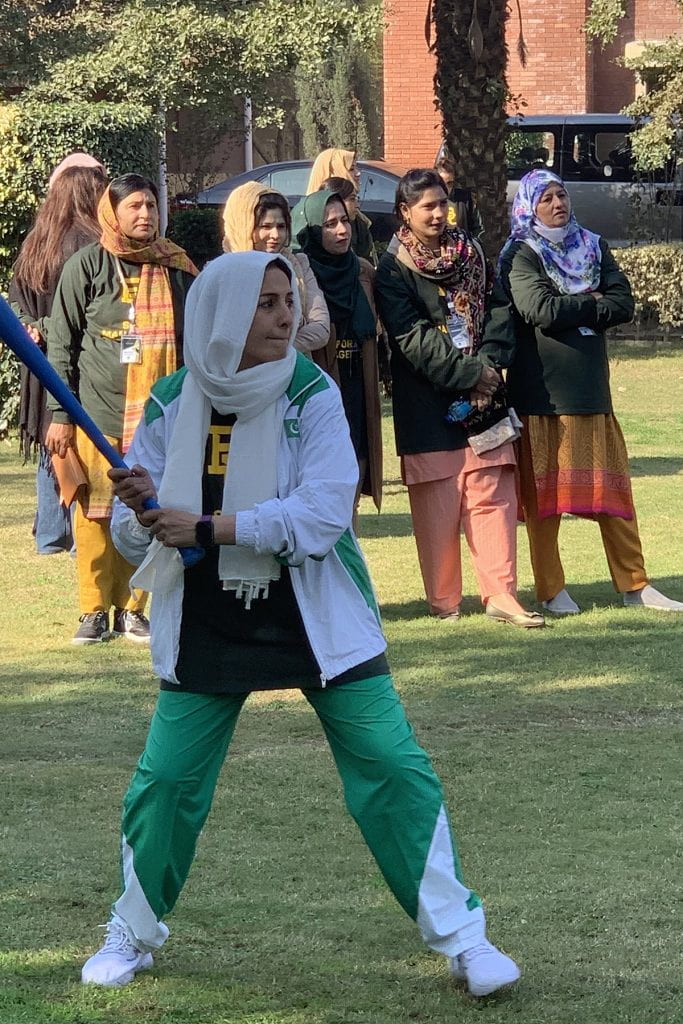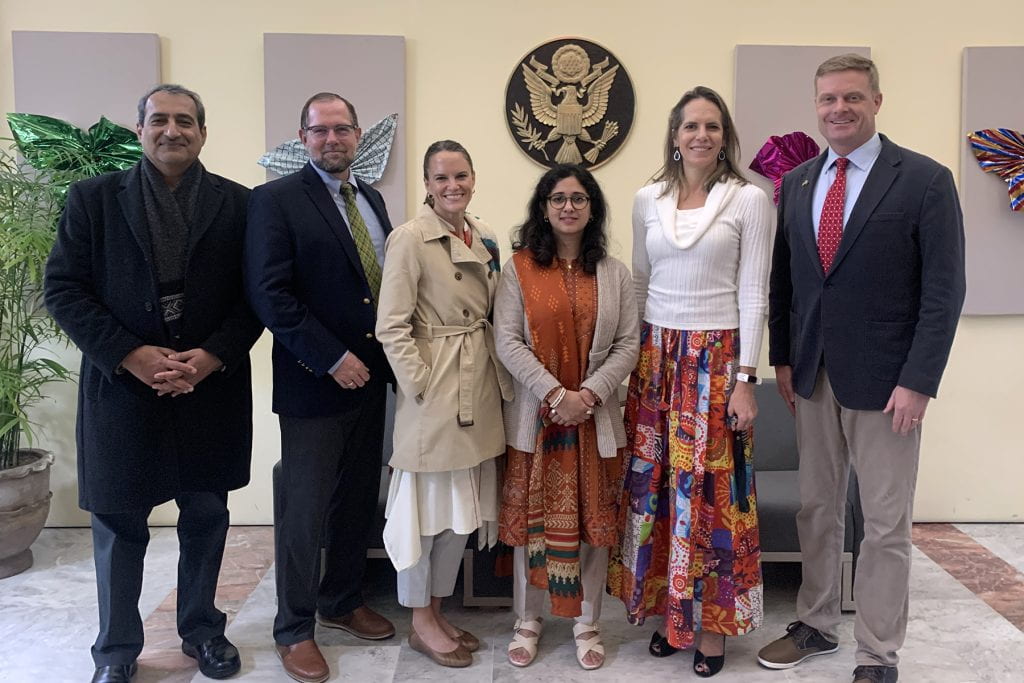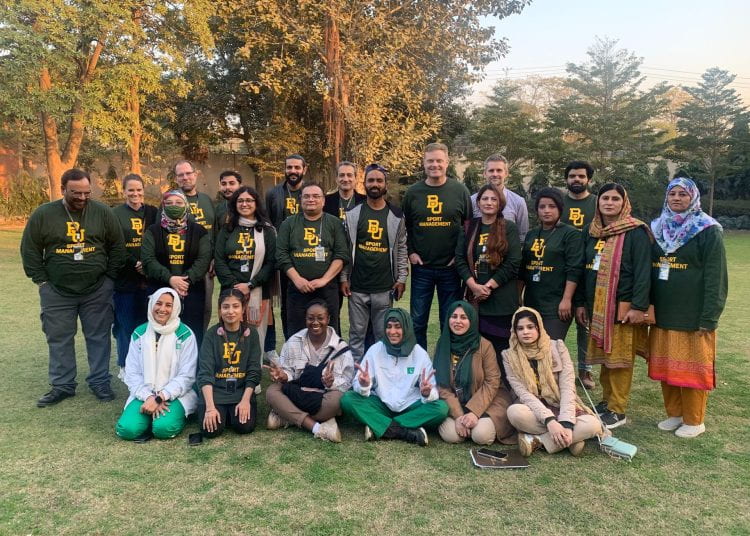By Dr. Bill Sterrett, Dr. Erik Ellefsen, and Jill Anderson
In 2023, the Baylor Center for School Leadership’s (BCSL) efforts expanded in unexpected ways through being invited into communities around the world. With a bit more cultural familiarity, the BCSL team had the opportunity to visit schools and speak in England, Canada, and Australia. Invited into new settings, the BCSL led Just Teaching leadership networks in South Asia, Africa, and Latin America. In March 2024, the team will be leading a delegation to UNESCO for the Global Inclusive School’s Forum, and professional development with educators from Indonesia.
In December, a team led by Bill Sterrett, PhD, Baylor Educational Leadership Department Chair and Co-Executive Director for the BCSL, including Meredith Frey, Master of Arts in School Leadership Fellow, Brooke Ramsey, a local Waco school leader, Charles Ramsey, PhD, Associate Chaplain in Baylor Spiritual Life, and Hina Abel, Baylor PhD candidate in Higher Education Studies and Leadership, had the opportunity to go to Pakistan as part of another unique project empowering women for leadership through sports. Sterrett and Co-Principal Investigator Mar Magnuson, PhD, Associate Professor of Sport Management, built partnerships with three universities in the Lahore and Faisalabad regions of Pakistan to help meet the call to support the inclusive development of all aspects of Pakistani society, fostering diversity and inclusion in civil society, empowering women and girls, and promoting interfaith and intra-faith harmony.
Through this grant, Innovating and Designing Engaging Applications in Sports Promoting Outreach, Responsibility, and Teamwork (IDEA-SPORT), Sterrett had a vision to foster life skills such as problem-solving, conflict resolution, teamwork, and leadership through sports.
“These sorts of grants help re-center perceptions and open new pathways for better understanding and collaboration among institutions and nation,” Sterrett said. “And they are a great fit in aligning with the BCSL’s goal to be the most effective leadership catalyst for educators worldwide.”
Frey, who was involved in the curriculum planning prior to the in-person workshops in Pakistan, expressed what a joy it was for her to work with Bill and the rest of the team and an answer to her prayers to work with teachers abroad.
“It was a really beautiful thing to see a cross-cultural team plan the curriculum for the trip,” Frey said.
Brooke Ramsey, Head of Grammar School at Valor Prep in Waco, TX, and part of Baylor’s team going to Pakistan, lived in Lahore, Pakistan for five years with her husband, Charles and their kids.
“An opportunity to revisit the land that had an impact on me as an adult person and my faith was significant,” Ramsey said. “To be able to integrate those two parts of my life (working with teachers and supporting people in Pakistan) was a real gift.”
The workshops in Pakistan were structured in a way that fostered insights on leadership concepts, sports teaching strategies, and time to play new sports together. In the morning, workshop sessions taught by Baylor colleagues focused on leadership, teamwork, problem-solving, and conflict resolution. This was followed each day by a session on learning a specific sport taught by a member of one of the participating institutions. Then, a panel of local experts, such as players or coaches of a university or the national team, shared insights on the sport. Finally, there was time for playing the sport.
“We saw the impact of playing together throughout the workshops,” said Abel. “Playing together undeniably lowers walls! We witnessed cultural boundaries being demolished. Even if this happens briefly, mixed-gender practices impact the psyche by allowing humans to respect and learn from each other, grow together, laugh, and have fun.”

Abel grew up and lived in Lahore until 2019. She said the grant emphasized working among marginalized communities and it was important for her to give that perspective to the team.
“If we can do this well, our children can do it even better, paving the way for national development,” Abel said. “Empowering women through sports develops their confidence to work in teams, negotiate situations, resolve and transform conflicts, and grow in a community, all of which is impossible through isolated academic work which has been the sole emphasis in Pakistani society.”
Ramsey shared Abel’s enthusiasm for men and women playing sports together.
“Getting people up and moving and delighting in playing games with one another was really great for establishing relationships and warming up the room,” Ramsey said. “We need to be doing and learning as a team and not in competition with others. It’s a large thing in Pakistani culture – emphasis in grades, ranking, and self-promotion.”
Ramsey went on to say that Pakistan is a very diverse country and has had some strides in women leadership that the United States has not had, having a woman prime minister for instance.
“Some of the most powerful and confident women I’ve met have been Pakistani women,” Ramsey said. “The issue is more about separation of men and women.”
Sterrett sees this work in Pakistan as a bridge to overcoming this hurdle. By the end of the week, Sterrett explained, participants were working together, playing soccer together in one large game, and the group learned a lot from each other.
“The principals and teacher leaders who attended the workshops were able to share feedback on how encouraging it was to come together to focus on both leadership and sports strategies that will impact their schools,” Sterrett said. “The IDEA-SPORT project goal is to eventually impact over 1,000 students in the Punjab region.”
Illustrating this idea, Ramsey said it was impactful to hear Pakistani women’s stories during the workshops. One woman took the opportunity to show self-defense tactics to the group.
“This woman was teaching self-defense and she said it was her passion to teach girls these skills,” Ramsey said. “Her mother died when she was young, and she was very poor. She went door-to-door selling items to survive. She was eventually married to a horribly abusive husband. She was later divorced. Yet, this woman was so strong and full of joy and delight.”
Through conversation and engaging together during the workshops, the opportunity opened for this this story and many more powerful personal tales to be shared among the group of university leaders, principals, teachers, graduate students, and high school students.
“No matter what culture we come from, human needs and human wants are all the same,” Ramsey said. “It’s so good to be confirmed that human connection is universal.”
The US Consulate General in Lahore shared this sentiment on their Facebook page, “Win or lose, participating in sports gives us the skills and confidence to become a force for positive change – no matter what we do in life.”

The workshops in Pakistan were just the beginning of this work. The partnership of universities and schools involved will continue to host monthly virtual calls to keep the professional learning community engaged. The grant funds also pay for sports equipment for the schools in Pakistan.
“This effort is off to a great start, and so much good is happening in sports leadership,” Sterrett said. “We hope we can indeed be a catalyst for leadership here at Baylor, and worldwide.”
Learn more about Drs. Sterrett and Ellefsen, and Jill Anderson from their bios posted on the Baylor Center for School Leadership website.
For more photos of the trip to Pakistan, visit us on Twitter, Instagram, LinkedIn or Facebook @baylorcsl.
